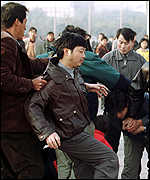Associated Press Writer

BEIJING (AP) -- The United Nations' top human rights official and senior Chinese leaders differedpublicly Tuesday over civil liberties, a day after signing an agreement to cooperate on improvingBeijing's rights protections.
An exchange at a conference on economic rights underscored the differing approaches between Chinaand the United Nations despite their agreement Monday to cooperate.
Opening the conference, Communist Party Politburo member Li Tieying insisted human rights wererelative, an argument the Communist Party leadership has long used to give economic developmentpriority over rights.
"Each country and each ethnicity has the right to determine its own system for protecting humanrights based on its own special conditions," Li said.
When her turn came to speak, Mary Robinson, U.N. high commissioner for human rights, urged Chinato accept "the universality of human rights" -- a concept underpinning two U.N. rights treaties thatBeijing has signed but not ratified.
President Jiang Zemin echoed Li's argument when he met with Robinson, telling her China has "its ownway of promoting and protecting human rights," the official Xinhua News Agency reported.
Moving Beijing toward implementing the two treaties -- one on economic, social and cultural rights, theother on civil and political rights -- was a key goal of the new agreement, which rights groupsimmediately criticized as ineffective.
Under the memorandum signed by Robinson and Chinese Vice Foreign Minister Wang Guangya,China agreed to U.N.-sponsored seminars on reforming its police, court and labor camp systems. Thefirst meeting, set for February, will touch on police powers to send suspects to forced-labor camps forup to three years without trial.
Robinson hailed the agreement as nudging China closer to standards set out in the two rights pacts.But rights groups faulted the agreement for doing no more than calling for workshops and notcommitting China to change.
"China could use this pretense of cooperation to muzzle U.N. monitoring procedures and publiccriticism of its human rights situation," New York-based Human Rights in China said in a statement.
Robinson conceded the agreement "won't change everything overnight" but said criticism should bemixed with efforts to help China implement reforms needed for ratification of the two rights pacts.
"It's not enough to criticize some aspects of China's human rights record -- and I have done and willcontinue to criticize -- unless you're prepared to engage when the door is open," Robinson toldreporters at the end of her two-day visit.
Robinson expressed "continuing serious concerns" over curbs on the freedom of expression anddismay at tightened controls over the Internet and detentions of migrants.
During a one-hour, 40-minute meeting with Jiang, she also raised concerns over China's treatment ofTibetans and of the banned Falun Gong [group].
In another sign of continued obstacles, Robinson said she inconclusively pressed Chinese leadersduring her two-day visit to allow unfettered access of a U.N. special monitor on torture. His plannedvisit last year was scotched after China put limits on his activities.
Although China is trying to make its police force more law-abiding, reports of torture and other abusespersist. A rights group reported Tuesday that two more Falun Gong members died in custody, raisingthe death toll among followers in the 16-month-old crackdown to at least 70.
Yang Guijun died Oct. 15 in Shandong province after a weeklong hunger strike to protest beatings, andLi Wenrui, a trade official from the northeastern city of Harbin, died Nov. 9 in Beijing in what policecalled a suicide, the Hong Kong-based Information Center for Human Rights and Democracy reported.
Rights groups point to the suppression of Falun Gong as the sort of disregard for basic liberties thatthey say Monday's agreement fails to address.
http://www.oweb.com/newslink/international/ChinaUNHumanRightsP0252.html
All content published on this website is copyrighted by Minghui.org. Non-commercial reproduction must include attribution (e.g. "As reported by Minghui.org, ...") and a link to the original article. For commercial use, contact our editorial department for permission.
Category: Falun Dafa in the Media










